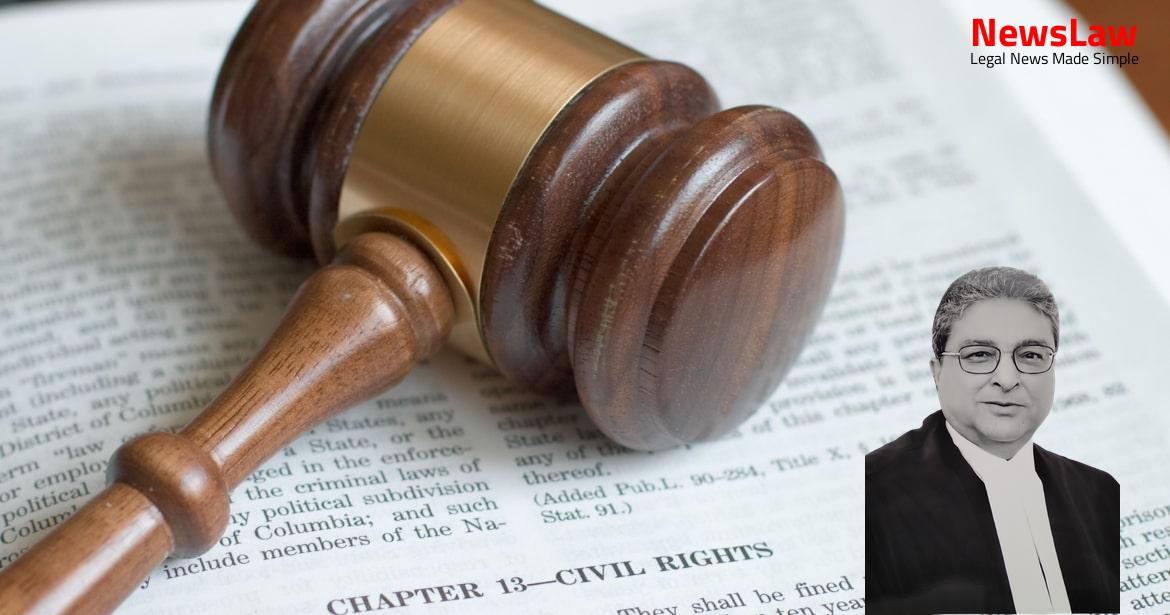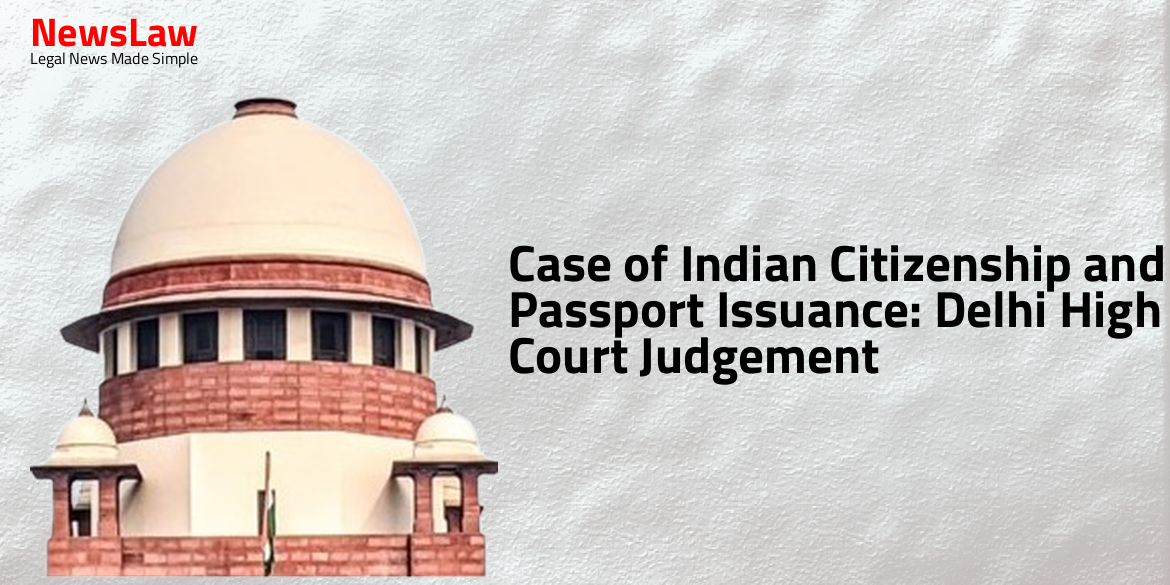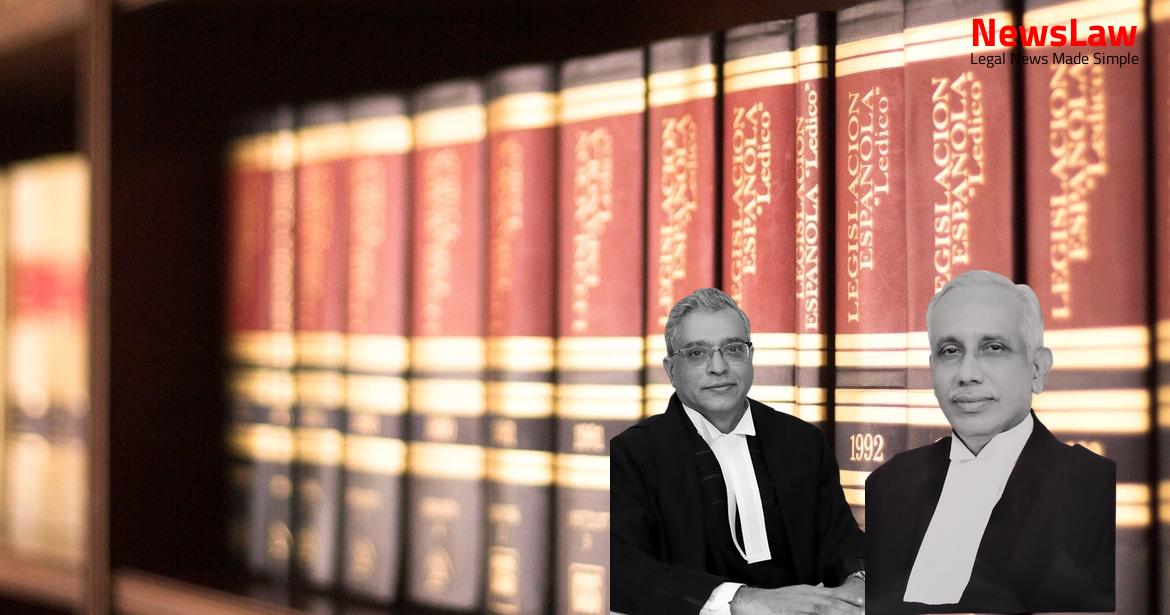Delve into a comprehensive legal analysis focused on social security and relief measures for families of Covid-19 victims. The court’s in-depth assessment of the Disaster Management Act, 2005 guides the discussion on the government’s duties and obligations in providing compensation. Stay tuned to uncover key insights into the legal intricacies surrounding Covid-19 relief measures.
Facts
- Two applications for intervention filed by family members who have lost their loved ones to Covid-19 are allowed.
- One application seeks social security and rehabilitation for Covid-19 victims.
- Another application seeks official documentation of cause of death and care for victims’ families.
- Prayers include mandamus against Union of India for social security, and direction to State Governments for official cause of death documents and care for victims.
- The interventions are allowed, and applicants can participate in the proceedings.
- The writ petitions seek ex gratia compensation under Section 12 of the Disaster Management Act, 2005 for families of deceased Covid-19 victims.
Also Read: Judicial Review of Delayed Writ Petition
Arguments
- The petitioner argues that the government has a social responsibility to provide compensation to the families of those who have died due to the Covid-19 pandemic.
- The petitioner relies on various court decisions such as Charan Lal Sahu v. Union of India and Samatha v. State of A.P. to support the argument that the government has a duty to protect individuals under disability.
- The government’s claim of fiscal inability to provide ex gratia compensation for Covid-19 deaths is contested, as it would set a dangerous precedent to evade constitutional duties.
- The word ‘shall’ in Section 12 of the Disaster Management Act, 2005 is emphasized as a mandatory obligation for the government to recommend guidelines, including providing ex gratia assistance for loss of life.
- Various states have announced different compensation amounts for Covid-19 deaths, highlighting the need for a uniform policy.
- The petitioner stresses the socialist nature of India and the government’s duty to ensure equal benefits for families of Covid-19 victims.
- The importance of issuing accurate death certificates with the correct cause of death due to Covid-19 is emphasized to prevent deprivation of government benefits and provide accurate data on pandemic-related deaths.
- The petitioner argues that Covid-19 qualifies as a disaster under the DMA 2005, and the government’s obligation to provide compensation is underscored.
- The refusal to pay ex gratia compensation for Covid-19 deaths is challenged as it goes against the principles of social security and contravenes constitutional rights.
- The plea of financial inability by the Central Government is countered as not a valid reason to deny statutory and constitutional obligations.
- The emphasis on Section 12(ii) and Section 12(iii) of the DMA 2005 in providing relief for disaster-affected individuals is highlighted.
- The Central Government has taken a dynamic and multi-pronged approach in response to the Covid-19 pandemic, utilizing funds from the NDRF, SDRF, and Consolidated Fund of India as per expert advice.
- Significant efforts have been made to ramp up health infrastructure, including testing, treatment, quarantine facilities, hospital facilities, oxygenated beds, ventilators, ICU facilities, and isolation beds, in response to successive waves of Covid-19.
- Various measures have been implemented to augment the health workforce, increase testing capacity, enhance surveillance, and provide insurance coverage for health workers.
- The response includes comprehensive steps such as testing, tracing, treatment, quarantine facilities, insurance for health workers, allocation of oxygen and essential drugs, vaccination development and distribution, food security for vulnerable groups, and economic support.
- The Central Government has adopted a whole-of-society and whole-of-government approach to tailor the national response to the evolving nature of the pandemic.
- Special provisions have been made considering the unique impact of Covid-19, leading to the adoption of different relief measures than those contemplated for traditional disasters by DMA 2005.
- The Government has taken a conscious decision to provide flexible relief measures through various Ministries/Departments, coordinated by the National Executive Committee as per the Disaster Management Act, 2005.
- Funding for Covid-19 response has been provided under the National Health Mission, and the approach to relief and resource utilization is tailored to the ever-changing requirements and uncertainties of the pandemic.
- The distinction is made between one-time disasters and ongoing disasters like Covid-19, which necessitate day-to-day management, financial expenditure, and changing priorities and methods of response.
- While guidelines under Section 12 of DMA 2005 may prescribe ex-gratia payments for one-time disasters, the concept of ‘Minimum Standards of Relief’ is relevant for ongoing disasters requiring continuous monitoring and dynamic response.
Also Read: Ownership Dispute: Legal Analysis on Admission and Decree
Analysis
- The section 12 of the Disaster Management Act, 2005 mandates the National Disaster Management Authority to recommend guidelines for minimum standards of relief in the event of disasters, including ex gratia assistance for loss of life.
- The Act defines ‘preparedness’ as readiness to deal with disaster situations and their effects.
- The Act also provides for the constitution of State Disaster Management Authorities and District Disaster Management Authorities.
- The word ‘shall’ in Section 12 signifies a mandatory duty on the National Authority to issue relief guidelines, including ex gratia assistance.
- The Act requires accurate certification of death causes, specifically for COVID-19 related deaths.
- The Finance Commission’s recommendations on risk insurance interventions have been acknowledged and NBMA is working towards aligning with expert opinions.
- The Act emphasizes on providing reliefs while considering the economic implications and policy priorities of the Government.
- The Act and Finance Commission’s reports guide the allocation of funds for disaster management and relief measures.
- Judicial review of government policies is limited to legality and not the wisdom or soundness of the policies.
- The Act requires a differentiated approach for disasters like COVID-19 due to its widespread impact.
- Guidelines for death certification and recording have been established to ensure accurate categorization of COVID-19 related deaths.
- Courts cannot interfere with economic policy, which is the function of experts.
- Judicial review on economic policies is limited to checking for violations of statutory provisions or the Constitution.
- Courts should ensure that no law is violated and fundamental rights are not transgressed upon.
- Courts should not undertake governmental duties or functions.
- Policy decisions on economic matters should be left to expert bodies.
- Courts should not debate academic matters or concern themselves with intricacies of trade and commerce in economic policy.
- The court can strike down directions issued by entities like the RBI if found wholly unreasonable or violative of the Constitution or any statute.
- The courts should not sit in judgment over matters of economic policy; such matters should be left to expert bodies.
- It is not the function of the courts to judge matters of economic policy or fiscal regulatory measures.
- Economic policy decisions and financial reliefs are to be decided by the government and RBI on the advice of experts.
- Laws relating to economic activities should be viewed with greater latitude than laws touching civil rights.
- Legislature should be allowed room for flexibility in dealing with complex problems in economic legislation.
- Government’s economic decisions may be illogical or rough but are subject to rough accommodation.
- The court cannot interfere with policy decisions unless they are patently arbitrary, discriminatory, or mala fide.
- Courts must uphold the rule of law and act within their permissible limitations to harness power in public interest.
- Courts should not transgress into the field of policy decision and should leave such matters to the relevant authorities.
- National Authority has the responsibility for laying down policies, plans, and guidelines for disaster management.
- National Authority recommends guidelines for minimum standards of relief to be provided to persons affected by disaster.
- Minimum standards of relief include provisions for shelter, food, drinking water, medical cover, and sanitation in relief camps.
- Special provisions are to be made for widows and orphans affected by disasters.
- Ex gratia assistance is provided for loss of life and damage to houses, along with assistance for restoration of livelihood.
- National Authority can lay down policies on disaster management, approve plans, and coordinate enforcement and implementation of disaster management policies.
- During emergencies, the Chairperson of the National Authority can exercise powers subject to post facto ratification.
- Advisory committee and National Executive Committee are constituted to assist the National Authority in disaster management functions.
- Central Government has to constitute a National Disaster Response Fund for meeting threatening disaster situations.
- The definition of disaster management, disaster, and guidelines for relief are provided in the Disaster Management Act of 2005.
Also Read: Interpretation of Statutory Limitation under Section 263(2)
Decision
- The court directed the Appropriate Authority to issue simplified guidelines for issuing Death Certificates stating the exact cause of death as ‘Death due to Covid-19’
- The guidelines are to be recommended within six weeks
- The observations made in paragraph 13 should be considered while issuing the guidelines
Case Title: GAURAV KUMAR BANSAL Vs. UNION OF INDIA (2021 INSC 318)
Case Number: W.P.(C) No.-000539 / 2021



